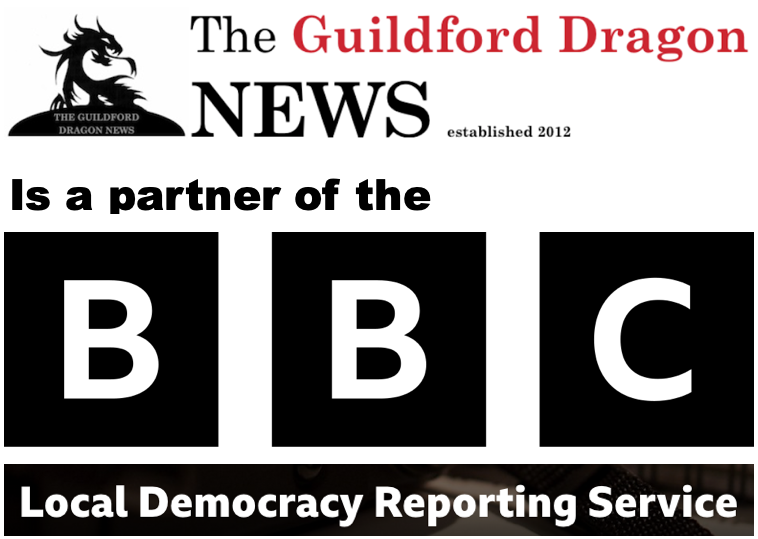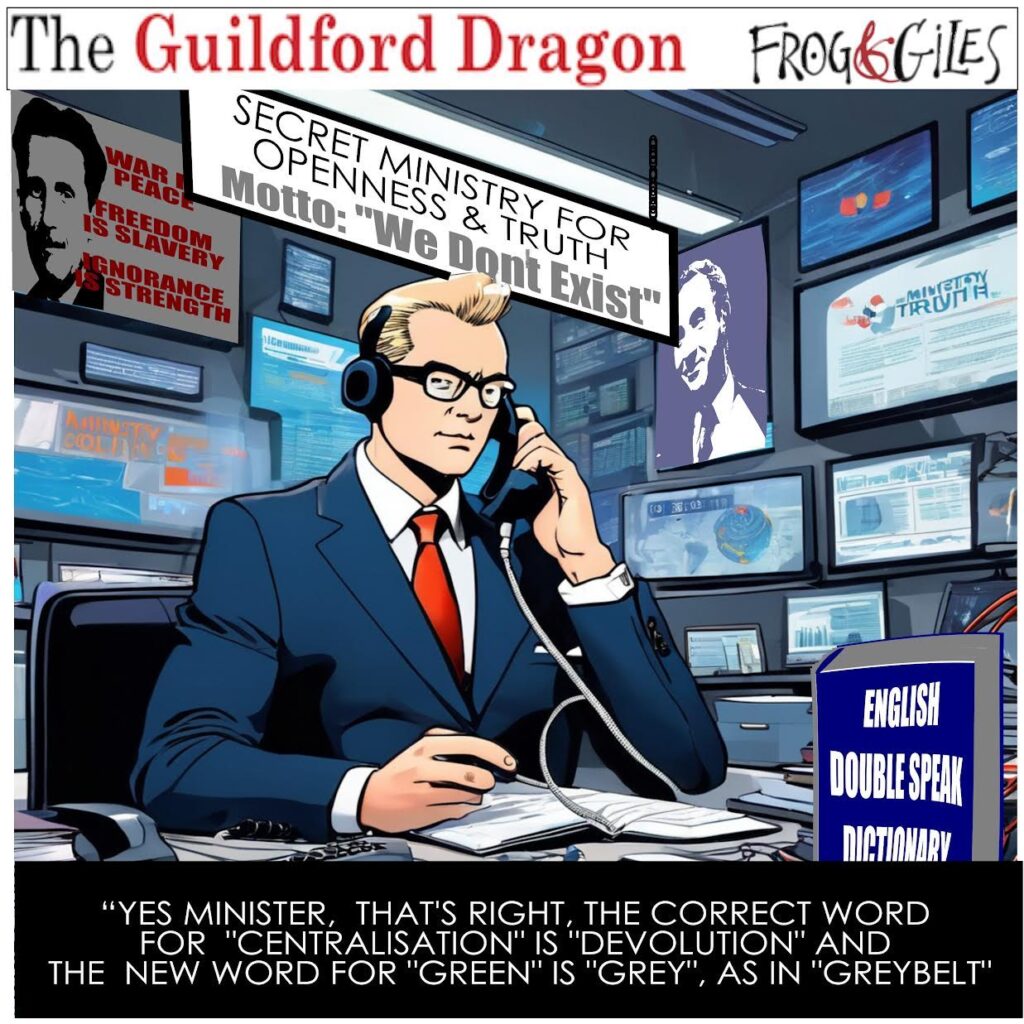 Abraham Lincoln
If given the truth, the people can be depended upon to meet any national crisis...
Abraham Lincoln
If given the truth, the people can be depended upon to meet any national crisis...
 Guildford news...
for Guildford people, brought to you by Guildford reporters - Guildford's own news service
Guildford news...
for Guildford people, brought to you by Guildford reporters - Guildford's own news service
GBC Keeps a Closed Mind to Open Government
Published on: 25 Oct, 2018
Updated on: 28 Oct, 2018
 Guildford Borough Council clearly does not understand the fundamental imperative of openness in democracy.
Guildford Borough Council clearly does not understand the fundamental imperative of openness in democracy.
A stark example this year has been the way it handled the proposal to invest a hefty £81 million (nearly up to its entire annual spend) in student accommodation at the University of Surrey.
As central government funding dries up, the council is being pushed to obtain revenue from speculative investments by a government policy encouraging councils to be “entrepreneurial”. And, putting the wisdom of introducing commercial level risk into public financing to one side, there was a reasonable case to be made for such an investment.
 Property investment is among the safer areas and there is continuing demand for student accommodation, 16,000 are enrolled in our university this year. If more of them can be accommodated in dedicated buildings the growing pressure on private housing, much needed for ordinary Guildford residents, would be reduced.
Property investment is among the safer areas and there is continuing demand for student accommodation, 16,000 are enrolled in our university this year. If more of them can be accommodated in dedicated buildings the growing pressure on private housing, much needed for ordinary Guildford residents, would be reduced.
A spin-off benefit could be that fewer students would face sub-standard rentals, shoe-horned in by greedy landlords.
Of course, such a GBC plan has hazards. What happens if something unforeseen leaves the taxpayer with a devalued asset? Should the council be encouraging further expansion of the University of Surrey? Is that sustainable? Would such an investment lead to a compromised position when considering related planning applications?
No doubt there are other arguments for and against.
The problem is none was aired in public and, unless they were, how can the council possibly assess public opinion on the matter?
But concern about public opinion has never been this council’s priority. Instead, once again, it used the excuse of commercial confidentiality to prevent open debate.
Let us remind ourselves of the fifth “Nolan Principle” of the seven by which GBC are required to operate. Under the heading “Openness” it says: “Holders of public office should act and take decisions in an open and transparent manner. Information should not be withheld from the public unless there are clear and lawful reasons for so doing.”
Obviously, “clear and lawful” reasons to withhold information might include different rates of interest offered by different lenders but what justification is there for not openly discussing whether such a large investment should have been made at all? It is clearly a matter of public interest: the money would be borrowed and invested in our name and we all stand to gain or lose.
To debate the principal decision without revealing anything confidential would have been perfectly possible, easy even, and fair to we taxpayers
Imagine a debate in parliament on our nuclear deterrent being held in secret because detailed plans of our nuclear submarines are classified?
That is unthinkable. As unthinkable as Guildford Borough Council really meaning what it says about openness.
Responses to GBC Keeps a Closed Mind to Open Government
Leave a Comment Cancel reply
Please see our comments policy. All comments are moderated and may take time to appear. Full names, or at least initial and surname, must be given.Recent Articles
- Mr Carpenter’s Byfleet Seedling and Other Varieties of Apples
- Guildford MP Visits Local Satellite Firm During 40th Anniversary Year
- Letter: Only a Town Council Will Give Us to the Option to Choose on Some Local Services
- Comment: Parish Councils – Who Cares?
- Update: North Street Re-opened
- Letter: Parish and Town Councils Will Become More Essential Than Ever
- Plans for Several Railway Repair Projects Over August Bank Holiday
- Letter: We Should Thank Parish Councillors
- Notice: Guildford Area u3a Group Enrolment Day, Tuesday, August 12
- DNA Test Breakthrough Led Police To Solve £35,000 Bramley Burglary



Recent Comments
- Jan Messinger on Comment: Parish Councils – Who Cares?
- Fiona White on Letter: What Do Parish Councils Do?
- Jim Allen on Letter: What Do Parish Councils Do?
- Nigel Mitchell on Letter: We Should Thank Parish Councillors
- Jan Messinger on Letter: We Should Thank Parish Councillors
- Jan Messinger on Letter: Parish Councillors Are Dedicated Volunteers
Search in Site
Media Gallery
Dragon Interview: Local Artist Leaves Her Mark At One of England’s Most Historic Buildings
January 21, 2023 / No Comment / Read MoreDragon Interview: Lib Dem Planning Chair: ‘Current Policy Doesn’t Work for Local People’
January 19, 2023 / No Comment / Read MoreA3 Tunnel in Guildford ‘Necessary’ for New Homes, Says Guildford’s MP
January 10, 2023 / No Comment / Read More‘Madness’ for London Road Scheme to Go Ahead Against ‘Huge Opposition’, Says SCC Leader
January 6, 2023 / No Comment / Read MoreCouncillor’s Son Starts Campaign for More Consultation on North Street Plan
December 30, 2022 / No Comment / Read MoreCounty Council Climbs Down Over London Road Works – Further ‘Engagement’ Period Announced
December 14, 2022 / No Comment / Read MoreDragon Interview: GBC Reaction to the Government’s Expected Decision to Relax Housing Targets
December 7, 2022 / No Comment / Read MoreHow Can Our Town Centre Businesses Recover? Watch the Shop Front Debate
May 18, 2020 / No Comment / Read More











David Roberts
October 27, 2018 at 6:51 pm
The Nolan Principles are reflected (albeit imperfectly) in Guildford councillors’ code of conduct, so transparency is something they have all – literally – personally signed up to.
The Executive’s attitude is thus a breach of their own code.
Paul Spooner
October 29, 2018 at 9:36 am
Factual correction: The decision whether to “Pink Sheet” an item is made by officers not exec or any other elected members and is accepted by democratic services manager.
Paul Spooner is the council leader at Guildford Borough Council
I’m rather puzzled by Cllr Spooner’s comment headed “Factual correction”. Perhaps he could explain exactly what stated fact he is trying to “correct”? It was not said in the article that the decision was made by the Executive or elected members. Do the Executive and elected members have no say in the matter? Surely the report could have been redacted, as necessary, to allow public debate of the principal decision. Editor
Paul Spooner
October 30, 2018 at 8:25 am
Members can have a say but the decision is made by officers. Personally, I think that wherever possible we should debate at full council and Executive in public, with only commercially sensitive confidential data held on pink papers and only go into private session if confidential data needs to be discussed.
Policy is agreed by members and we need to look at why officers are placing more items into private session than ever before, given policy has not changed for years.
David Roberts
October 29, 2018 at 5:17 pm
So, instead of transparency, Cllr Spooner’s comment creates yet more obfuscation.
What on earth is “pink sheeting”? And why does this council have such a problem with normal, open behaviour?